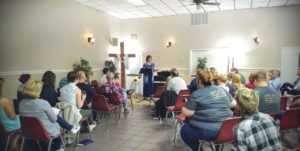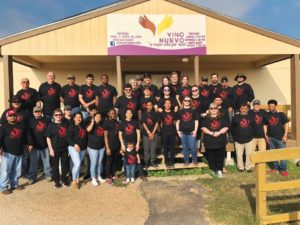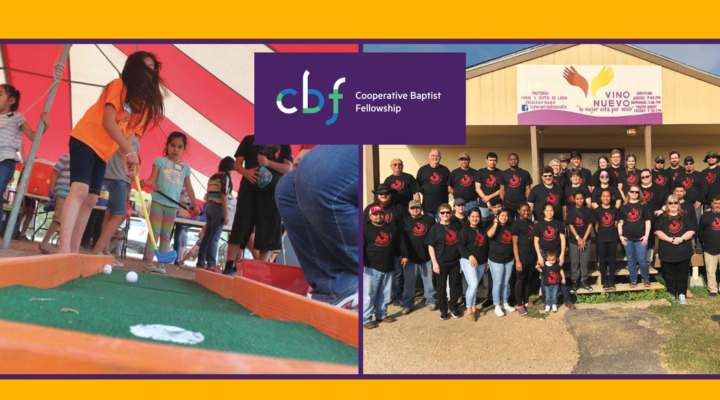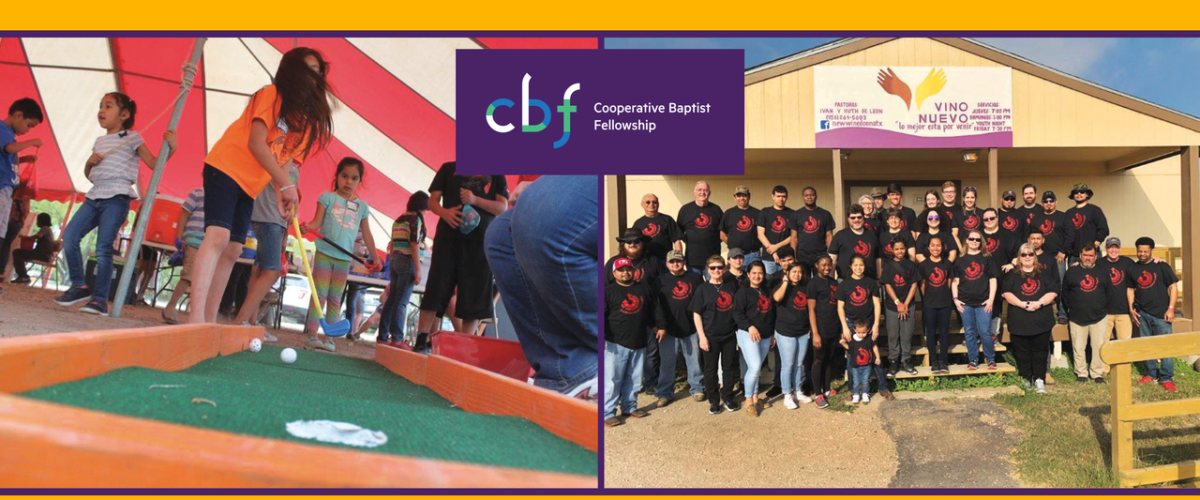Imagine what attending a new Cooperative Baptist Fellowship church must be like in the Southwest. Be prepared for a kaleidoscope of thoughts, because young CBF congregations are as varied as the region. If you attended a CBF church start here, you might:
• Study the Bible under a carport in one of the nation’s poorest counties, right next to Mexico.
• Sing praise choruses in a school building southwest of Houston.
• Eat with an eclectic mix of students and young adults near downtown Phoenix.
• Play with children in a trailer park in West Texas.
• Ponder hard questions with newcomers to one of the nation’s fastest-growing counties.
• Worship, pray, laugh and cry in a symphony of languages.
Starting churches—in a collage of cultures, meeting a mosaic of needs—is a priority for Fellowship Southwest and its regional partners. In fact, the majority of church starters commissioned at the 2018 CBF General Assembly in Dallas were connected to Fellowship Southwest.

Rev. Robin Drake shares her testimony of ministerial calling during her ordination service at Peace of Christ Church in Round Rock, Texas.
CBF achieves cultural diversity by starting congregations on two tracks in the Southwest. But both tracks head in the same direction—toward sustainable churches that match the people and meet the needs of their communities.
One track reflects CBF’s typical church-starting model. It begins with a pastor and/or a core group who live in the same area. They develop a mission, vision and values suited to their context and build on that foundation.
The other track focuses on ministry in some of the region’s poorest neighborhoods, among Hispanic residents. It engages support of churches from far away, who partner locally and return repeatedly. They start by meeting physical needs; then they add a Bible study that eventually becomes a church.
Both approaches translate the Gospel into the local culture. Neither requires tons of cash. Both build upon relationships. Neither pushes a preconceived idea of “church.” Both result in vibrant congregations.
“Our focus is to come around individuals or form groups of people who are discerning a call to start churches,” said Andy Hale, who served as CBF’s church-starting leader for the past four years. If that answer is “yes,” then CBF equips church starters with coaching and mentoring, peer support, leadership development and spiritual renewal.
Those resources help launch congregations scaled to their neighborhoods or the needs of specific groups, Hale explained. “So, all of our church starts look different, feel different, follow different approaches. Some are ministry-driven, while others are relational-driven or worship-driven. All of them are contextual and organic and unique.”
Take, for example, Peace of Christ Church in Round Rock, Texas, launched by Kyle Tubbs in 2012.
“In the first year, developing a core group was the most important thing we did,” Tubbs recalled. “CBF didn’t come over the top and tell us what to do, but they provided the framework for developing our mission, vision and core values. CBF helped me develop as a leader, and they helped us develop a missiology—a philosophy for meeting needs in our own context.”

Children in Donna, Texas, enjoy a game of putt-putt during the Vacation Bible School hosted by The Crossing Baptist Church of Mesquite, Texas. Although located 500 miles from the Rio Grande Valley, The Crossing Baptist Church is a faithful partner in the area through CBF’s rural development coalition, Together for Hope.
That context is crowded and cosmopolitan. The population of Williamson County, just north of Austin, leaped from 240,000 to 550,000 in less than two decades. “The growth is primarily young professionals, moving from various places in the country because of jobs,” Tubbs said. “These people are not part of a church, but they are smart and open-minded. They want to love their neighbors indiscriminately, and this fits CBF culture. They want to welcome everyone.”
A growing collection of young families feel welcomed at Peace of Christ. “About one-third have a CBF background; but we have members from Methodist, Episcopal, Church of Christ and nondenominational backgrounds,” he noted. “But the common denominator is they were either done or almost done with church.”
This summer, the CBF church starting program and Peace of Christ Church experienced a transition as Hale accepted a call to become pastor of University Baptist Church in Baton Rouge, La., and Tubbs joined the CBF staff to head up church starting.
Meanwhile, church starting across the U.S.-Mexico borderlands will continue to build upon missions. “Working in poverty means we have to do church planting differently,” reported Jorge Zapata, associate coordinator of CBF Texas, who has helped launch numerous churches in cooperation with Together for Hope, CBF’s rural development coalition.
“In order to start churches in colonias (poor rural unincorporated villages), border churches need strong partners,” Zapata said, noting it’s a multi-year process.
“In the first year, we build relationships in the community,” he said. “We start by knowing the community and the needs of the people there. We also start a Bible study, usually in a carport or a garage.” They rely heavily on mission teams from established churches across the Southwest.
“In the second year, we continue doing those ministries while we look at property and look for partners to buy the property. And while we’re doing that, we’re working with a group of new believers in discipleship, leadership development and how to use their church building like a community center.
“We also identify a pastor from the colonia. Most have no formal education or seminary training, so we help the pastor with theology, the function of the church and how to develop a leadership team. It takes about three to five years to establish a church, but when a colonia church is developed, it is strong financially, biblically and in community ministries.”
This approach provides a model that enables far-away congregations to help start churches in locations with acute need, noted Scott Collins, a lay member and longtime missions leader at The Crossing Baptist Church in Mesquite, Texas. The Crossing, a multicultural congregation, got into church starting in the Rio Grande Valley through Together for Hope.
“We didn’t go into this thinking we would start a church,” Collins remembered. “We wanted to provide humanitarian aid for people in one of the poorest counties in the country. After three or four years, when we had been renovating homes, providing medical care and teaching English as a second language, we asked: What’s our end game? We decided maybe starting a church was a possibility here. But it began with New Testament-model humanitarian aid.”

A team from The Crossing Baptist Church in Mesquite, Texas, spent spring break on a mission trip in Donna, Texas, where they served in the colonias of South Texas. The group helped build a house for a single mother with three children, painted houses and hosted block parties for the community. The Crossing Baptist is also committed to starting new churches in the area.
The Crossing worships 500 miles from the Valley, which could present logistical challenges. But the church began partnering with Zapata and his local congregation. Other upstate churches also provided various aspects of ministry, particularly in construction. And when they found a local leader to be pastor, “that’s when it took off,” Collins said.
Now, The Crossing, which welcomes 120 worshipers “on a good Sunday,” is helping start its third congregation. During spring break, 40 church members, including about 20 Spanish-speakers, began the slow, steady community-based ministry that one day will result in another church.
The Southwest desperately needs both Spanish-speaking and English-speaking Hispanic churches, said Jesse Rincones, executive director of the Hispanic Baptist Convention of Texas and a strong Fellowship Southwest partner. He cited the drastic demographic shift from Anglo to Hispanic, pointing to declining traditional churches amidst booming Hispanic populations.
“Church starts and restarts are necessary, or else the Baptist witness in these communities will disappear in a few years,” he said.
And CBF church starting is valuable in all kinds of communities across the region, Tubbs added. “We’ve loved CBF as a partner,” he said. “They’ve supported us as we discerned God’s call for our church. As we’ve translated the Gospel into our culture, they’ve come alongside us and helped us and been a partner with us. We’re deeply grateful for their hard work.”
Learn more about CBF’s New Church Starts Initiative at www.cbf.net/churchstarts
This article was first published in the Summer 2018 issue of fellowship! magazine, the quarterly publication of the Cooperative Baptist Fellowship. This special issue is devoted to Fellowship Southwest, CBF’s new regional network launched to strengthen ecumenical collaboration and to produce positive change in Oklahoma, Texas, New Mexico, Arizona and Southern California. Visit www.fellowshipsouthwest.org to keep up with the work of Fellowship Southwest.
Subscribe to fellowship! magazine and CBF’s weekly e-newsletter fellowship! weekly at www.cbf.net/subscribe.


